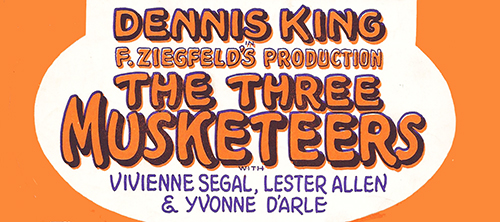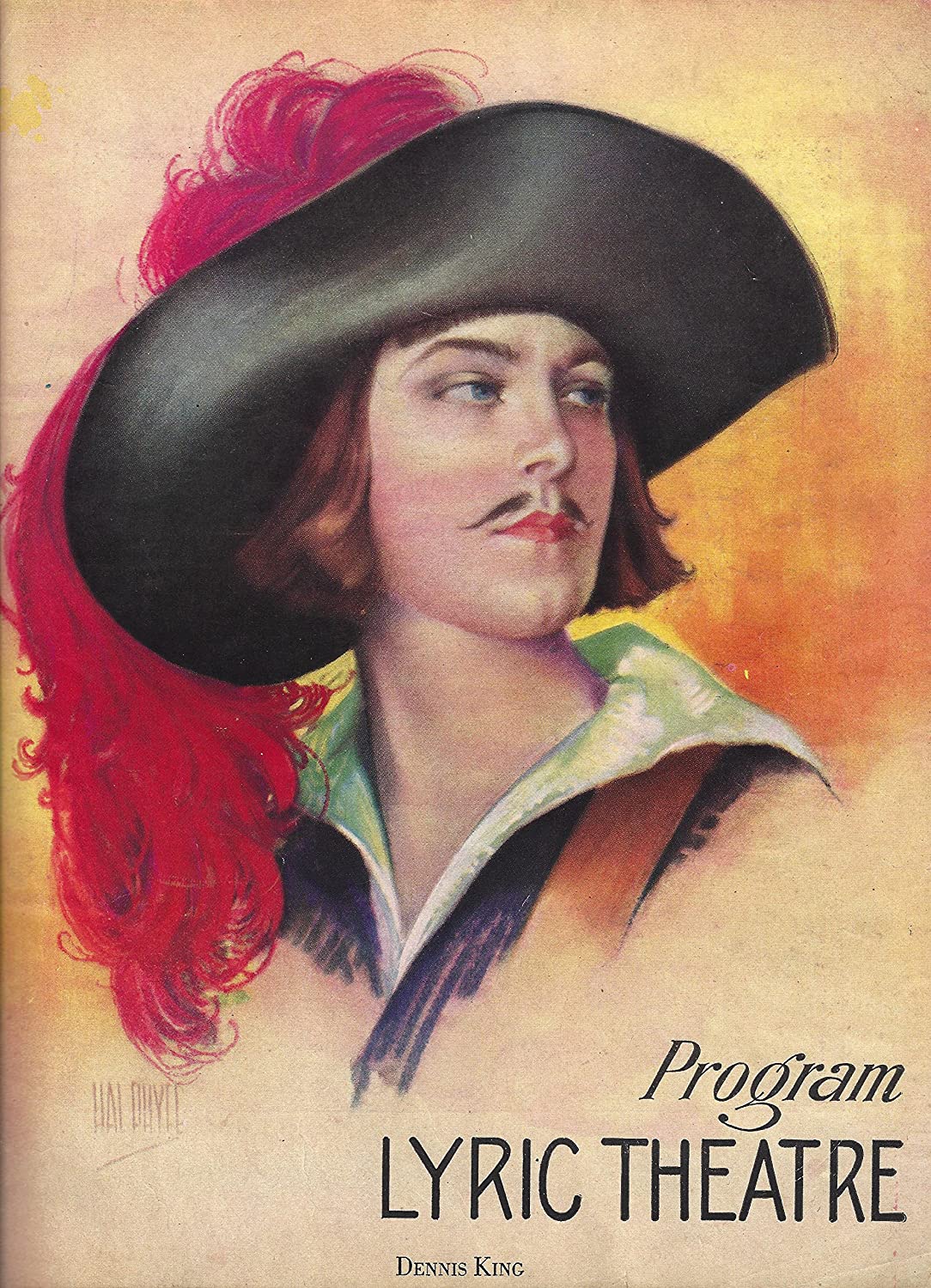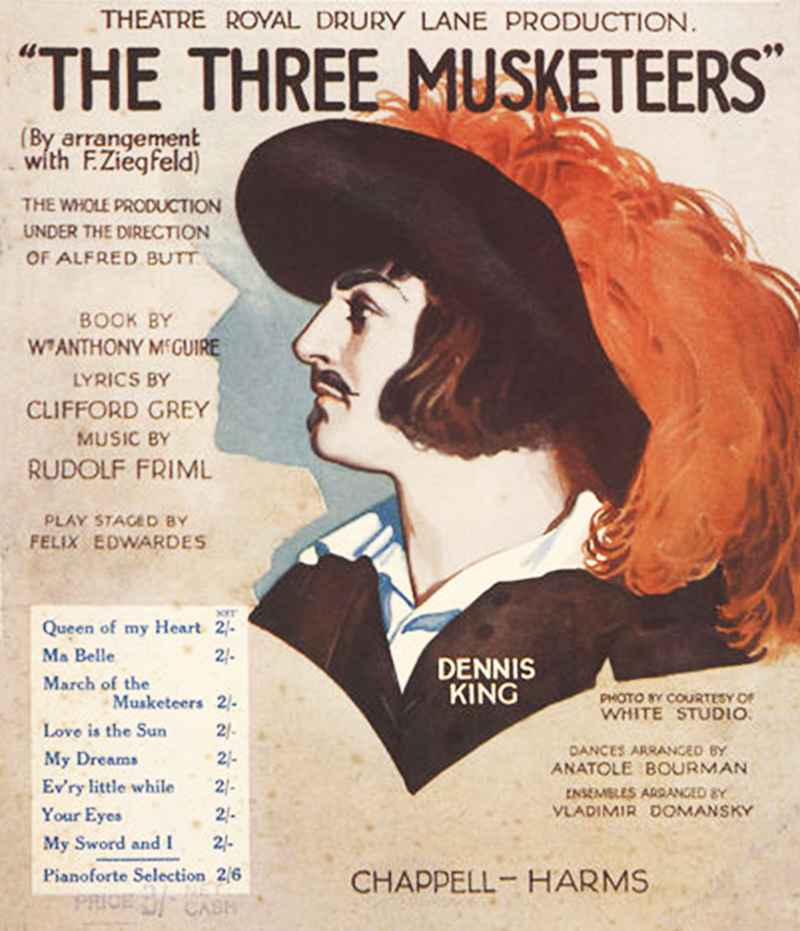
Un musical à succès basé sur le roman "Les Trois Mousquetaires" d'Alexandre Dumas.

Version 1
Three Musketeers (The) (Friml) (1928-03-Lyric Theatre-Broadway)
Type de série: OriginalThéâtre: Lyric Theatre (Broadway - Etats-Unis)
Durée : 9 mois 1 semaine
Nombre : 318 représentations
Première Preview : mardi 13 mars 1928
Première : mardi 13 mars 1928
Dernière : samedi 15 décembre 1928
Mise en scène : William Anthony McGuire •
Chorégraphie :
Producteur :
Avec : Robert D. Burns (Sergeant Jussac), Louis Hector (Comte de la Rochefort), Harrison Brockbank (Innkeeper), Naomi Johnson (Zoe), Vivienne Osborne (Lady De Winter), Detmar Poppen (Porthos), Douglass R. Dumbrille (Athos), Joseph Macaulay (Aramis), Vivienne Segal (Constance Bonacieux), Lester Allen (Planchet), Dennis King (D’Artagnan), John Clarke (The Duke of Buckingham), Yvonne D’Arle (Queen Anne), John Kline (M. de Treville), Reginald Owen (Cardinal Richelieu), Clarence Derwent (Louis XIII), William Kershaw (Brother Joseph), Harriet Hoctor (Premiere Danseuse of the Court), Catherine Hayes (Aubergiste), Richard Thornton (The Bo’sun), Raymond O’Brien (Patrick); Cardinal’s Guards: Andy Jochim and Randolph Leyman; Ladies in Waiting: Evelyn Groves, Lee Russell, Gertrude Williams, Mary McDonald, Pirkko Ahlquist, Marion Dodge, and Edna Bunte; Gerald Moore (King’s Attendant) The Albertina Rasch Dancers: Virginia Beardsley, Dona Desne Curry, Rose Gale, Eva Hellesnes, Marguerite Eisele, Nora Puntin, Louise Raymond, Yvonne Beaupre, Regina Tushinsky, Nona Otero, Lydia Krushinsky, Lucille O’Connor, Wilma Kaye, Helen Derby, Jeanette Bradley, Mildred Turner; Ladies of the Ensemble: Nancy Corrigan, Lillian White, Pauline Hall, Vida Hanna, Eleanor Buffington, Marie Merrifield, Julia Lane, Esther Peters, Sylvia Derby, Margaret Clarke, Byrdetta Evans, Eleanor Little, Emily Hadley, Libby Hanley, Ivy Palmer, Marye Bern, Frances Kelley, Lotta Marcy, Ann Moss, Helen Withers, Elaine Lank, Katherine Cavelli, Audrey Davis, Sally Hadley, Ellen Moray, Joan Marren, Hilda Steiner, Elsie Reign, Dorothy Greenley, Miriam Stockton, Dorothy Sutton, Margaret Valient; Gentlemen of the Ensemble: Martin Sheppard, A. Muzzi, Glen McCauley, John Zak, Ernest Ehler, Harry James, William Dillon, Armand Van Mueller, William Hagen, Robert Shields, Norman Ives, Stanley Howard, Charles Kirby, L. Dumbadse, Ivan Ismailov, Serge Vino
Presse : J. Brooks Atkinson in the New York Times said the operetta was “lavishly” mounted in Ziegfeld’s “bounteous style” and was “a matchless achievement in design and expression.” William Anthony McGuire’s “excellent libretto” created “bold” characters engaged in “drinking, loving and fighting in the service of royalty,” and the story was complemented by Friml’s “rushing” and “captivating” score. Those who had read Dumas’s novel would find the evening “vivid, ebullient and bubbling,” and already some were dubbing the new work a “grand operetta.” As for King, he sang and acted in “the grand manner.” Charles Brackett in the New Yorker noted that King acquitted himself “with grace” but seemed “a trifle orchidaceous in comparison with the Fairbanks interpretation of the character” (Douglas Fairbanks had starred in a 1921 silent film adaptation). Otherwise, the décor was “lavish,” the Albertina Rasch dancers possessed “hypnotic grace,” and Friml had composed a “good, thick, rambunctious score.” Mary Ann Miller in the Indianapolis Star said the score was “rousing” and the libretto “worthy of Dumas’ swashbuckling novel.” The work was “a most skillfully artistic production, directed with a fine discernment and acted as a spirited and humorous romance.” Arthur Pollock in the Brooklyn Daily Eagle singled out “Ma Belle” and “(March of the) Musketeers” as the score’s best songs, and suggested the evening would have been better served had it been shorter. Further, the book was somewhat austere and needed to be “a little louder, more hilarious, gustier—something looser, more pungent, racier and red-eyed.” As a result, the production “just misse[d] being good enough to go on until midnight.” Time summed up the plot by noting that D’Artagnan and the Three Musketeers spend their time “serving the King of France” and “making love to ladies.” The chorus girls “capered” about the stage dressed in “wide skirts and bonnets,” and if “equipped with dusters” they’d “look as if they had just jumped out of a can of glorified Dutch Cleanser.” Percy Hammond in the Pittsburgh Press praised the “melodious” score and said King had “the voice of a nightingale, the shape of Apollo, the charm of Laurette Taylor, the valor of a U.S. Marine, the punch of Eugene Tunney, and the impishness of Puck.” During the run, four songs were cut, “My Sword (and I),” “Te Deum,” “Heart of Mine,” and “Until We Say Goodbye,” and three were added, “Every Little While,” “Your Eyes,” and “Gascony” (aka “Gascony Song” and “Gascony Bred”). Dropped during the tryout were “One Smile from You,” “Shipmates All,” “Noah,” and “Near You.”
Au début du XVIIe siècle en France, le pauvre mais très viril d’Artagnan se rend à Paris pour rejoindre les Mousquetaires (les gardes du corps du roi). Il rencontre et tombe amoureux de Lady Constance Bonacieux, une dame d’honneur de la reine Anne. Pendant ce temps, le cardinal Richelieu apprend que la Reine a donné au duc de Buckingham, en gage de son amour, une broche avec des diamants qui était un cadeau du Roi. Richelieu suggère au Roi de demander à la reine de la porter lors d’un gala royal prévu. Richelieu envoie le Comte de Rochefort et Milady de Winter à Londres pour récupérer le joyau qu’il prévoit de dévoiler lui-même lors du gala afin de révéler que la Reine a été infidèle au Roi.
La Reine demande à sa dame d’honneur, Constance Bonacieux, d’impliquer les mousquetaires dans la récupération du bijou afin qu’elle puisse déjouer le complot. Mais quand les mousquetaires arrivent à Londres, il est trop tard: Lady de Winter est arrivée en premier. D’Artagnan utilise ses charmes sur Milady de Winter pour lui voler le précieux bijou. Après un combat à l’épée, les mousquetaires tuent le Comte de Rochefort et retournent à Paris juste à temps pour apporter le bijou pour le gala. Le Roi Louis le fixe à l’épaule de la Reine comme il l’a fait lorsqu’il lui a donné pour la première fois.
1 Three Musketeers (The) (Friml) peut-être considéré comme un Top musical
1928 - Broadway
Alors que la belle saison 1928-1929 avançait, un autre musical allait se rajouter au nombre déjà important de succès. Le «The Three Musketeers» de Rudolf Friml était aussi un élément de plus que le compositeur rajoutait à sa série de succès romantiques dont «The Vagabond King» (1926). Il avait choisi Dennis pour jouer D’Artagnan qui fut le Roi Vagabond dans le musical dont nous venons de parler mais aussi l’acteur-vedette de son «Rose-Marie» (1927). La partition de «The Three Musketeers» n’a délivré aucune chanson qui soit devenu un classique, mais il s’agit d’une bonne musique solide dans la tradition des opérettes de l’époque (une chanson de marche, une chanson à boire et de nombreuses ballades). Ce fut aussi le dernier succès de Friml Broadway. Plus tôt dans la saison, déjà, «The White Eagle» n’avait tenu l’affiche que quelques semaines (48 représ.), et ses deux derniers musicals eurent de très courtes séries: 21 représentations pour «Luana» () (1930) et 25 représentations pour «Music Hath Charms» () (1934).Pour le producteur Florenz Ziegfeld, ce musical est son cinquième succès d’affilée. Au cours de la saison précédente, «Rio Rita» avait été créée (494 représentations) puis, au début de la saison 1927-1928, il présenta l’édition 1927 des Ziegfeld Follies () (qui mettait en vedette Eddie Cantor, Cliff Edwards, et Ruth Etting et a présenté le «Shaking the Blues Away» d’Irving Berlin), «Show Boat» () et «Rosalie» (). Le blockbuster «Whoopee» () suivra plus tard dans l’année.
A la création, «The Three Musketeers» proposait des décors somptueux de Joseph Urban, la majorité des costumes étaient de John W. Harkrider, et la vedette féminine était Vivienne Segal (Constance Bonacieux), poursuivant ici son remarquable palmarès de créations de rôles majeurs dans les opérettes et musicals d’importants paroliers et compositeurs.
1930 - Londres
Deninis King, qui avait créé le rôle de D'Artagan à Broadway, a repris son rôle à Londres en 1930 au Theatre Royal Drury Lane. Le spectacle s'est joué durant 272 représentations.1984 - Broadway
Un revival a ouvert le 11 Novembre 1984, au Broadway Theatre, pour 9 représentations, un terrible flop. Tout fut confus: Tom O'Horgan était le metteur en scène mais abandonna son poste quelques jours avant la première, le cédant à Joe Layton. L’échec a été terrible, malgré une très belle distribution: Michael Praed (D’Artagnan), Liz Callaway (Constance), Chuck Wagner (Athos), Brent Spiner (Aramis), Ron Taylor (Porthos), Ed Dixon, Joseph Kolinsky, Marianne Tatum, et Viva Salno. La production a conservé sept chansons de l’original, «All for One and One for All», «My Sword (and I)» (qui avait été supprimée lors de la création originale de Broadway), «(My) Dreams», «(March of the) Musketeers», «Gossips», «Ma Belle» et «Gascony» (rajoutée lors de la série originale de Broadway). «Only a Rose» de «The Vagabond King» a été ajoutée. Les sources musicales pour d’autres chansons utilisées dans le revival ne sont pas claires.Acte I
All for One – Aramis, Athos and Porthos
The 'He' for Me – Constance, Girls, Aramis, Athos and Porthos
My Sword – D'Artagnan and Company
Heart of Mine – D'Artagnan and Constance
My Sword and I – D'Artagnan and Villagers
Vesper Bell – The Pensionaires
Dreams – Queen Anne
Te Deum – D'Artagnan and Nuns
March of the Musketeers – D'Artagnan, Athos, Porthos, Aramis and Musketeers
Colonel and Major – Planchet and Girls
Love is the Sun – Queen Anne, Constance and The Duke of Buckingham
Heart of Mine (reprise) – Constance and D'Artagnan
Welcome to the Queen – Ladies and Courtiers
Acte II
My Belle – Aramis
Kiss Before I Go – Constance and D'Artagnan
Pages – Albertina Rasch Dancers
Queen of My Heart – The Duke of Buckingham
Gossip – Planchet and Ladies
Until We Say Goodbye – Constance Bonacieux
Aucun dossier informatif complémentaire concernant Three Musketeers (The) (Friml)

Version 1
Three Musketeers (The) (Friml) (1928-03-Lyric Theatre-Broadway)
Type de série: OriginalThéâtre: Lyric Theatre (Broadway - Etats-Unis)
Durée : 9 mois 1 semaine
Nombre : 318 représentations
Première Preview : mardi 13 mars 1928
Première : mardi 13 mars 1928
Dernière : samedi 15 décembre 1928
Mise en scène : William Anthony McGuire •
Chorégraphie :
Producteur :
Avec : Robert D. Burns (Sergeant Jussac), Louis Hector (Comte de la Rochefort), Harrison Brockbank (Innkeeper), Naomi Johnson (Zoe), Vivienne Osborne (Lady De Winter), Detmar Poppen (Porthos), Douglass R. Dumbrille (Athos), Joseph Macaulay (Aramis), Vivienne Segal (Constance Bonacieux), Lester Allen (Planchet), Dennis King (D’Artagnan), John Clarke (The Duke of Buckingham), Yvonne D’Arle (Queen Anne), John Kline (M. de Treville), Reginald Owen (Cardinal Richelieu), Clarence Derwent (Louis XIII), William Kershaw (Brother Joseph), Harriet Hoctor (Premiere Danseuse of the Court), Catherine Hayes (Aubergiste), Richard Thornton (The Bo’sun), Raymond O’Brien (Patrick); Cardinal’s Guards: Andy Jochim and Randolph Leyman; Ladies in Waiting: Evelyn Groves, Lee Russell, Gertrude Williams, Mary McDonald, Pirkko Ahlquist, Marion Dodge, and Edna Bunte; Gerald Moore (King’s Attendant) The Albertina Rasch Dancers: Virginia Beardsley, Dona Desne Curry, Rose Gale, Eva Hellesnes, Marguerite Eisele, Nora Puntin, Louise Raymond, Yvonne Beaupre, Regina Tushinsky, Nona Otero, Lydia Krushinsky, Lucille O’Connor, Wilma Kaye, Helen Derby, Jeanette Bradley, Mildred Turner; Ladies of the Ensemble: Nancy Corrigan, Lillian White, Pauline Hall, Vida Hanna, Eleanor Buffington, Marie Merrifield, Julia Lane, Esther Peters, Sylvia Derby, Margaret Clarke, Byrdetta Evans, Eleanor Little, Emily Hadley, Libby Hanley, Ivy Palmer, Marye Bern, Frances Kelley, Lotta Marcy, Ann Moss, Helen Withers, Elaine Lank, Katherine Cavelli, Audrey Davis, Sally Hadley, Ellen Moray, Joan Marren, Hilda Steiner, Elsie Reign, Dorothy Greenley, Miriam Stockton, Dorothy Sutton, Margaret Valient; Gentlemen of the Ensemble: Martin Sheppard, A. Muzzi, Glen McCauley, John Zak, Ernest Ehler, Harry James, William Dillon, Armand Van Mueller, William Hagen, Robert Shields, Norman Ives, Stanley Howard, Charles Kirby, L. Dumbadse, Ivan Ismailov, Serge Vino
Presse : J. Brooks Atkinson in the New York Times said the operetta was “lavishly” mounted in Ziegfeld’s “bounteous style” and was “a matchless achievement in design and expression.” William Anthony McGuire’s “excellent libretto” created “bold” characters engaged in “drinking, loving and fighting in the service of royalty,” and the story was complemented by Friml’s “rushing” and “captivating” score. Those who had read Dumas’s novel would find the evening “vivid, ebullient and bubbling,” and already some were dubbing the new work a “grand operetta.” As for King, he sang and acted in “the grand manner.” Charles Brackett in the New Yorker noted that King acquitted himself “with grace” but seemed “a trifle orchidaceous in comparison with the Fairbanks interpretation of the character” (Douglas Fairbanks had starred in a 1921 silent film adaptation). Otherwise, the décor was “lavish,” the Albertina Rasch dancers possessed “hypnotic grace,” and Friml had composed a “good, thick, rambunctious score.” Mary Ann Miller in the Indianapolis Star said the score was “rousing” and the libretto “worthy of Dumas’ swashbuckling novel.” The work was “a most skillfully artistic production, directed with a fine discernment and acted as a spirited and humorous romance.” Arthur Pollock in the Brooklyn Daily Eagle singled out “Ma Belle” and “(March of the) Musketeers” as the score’s best songs, and suggested the evening would have been better served had it been shorter. Further, the book was somewhat austere and needed to be “a little louder, more hilarious, gustier—something looser, more pungent, racier and red-eyed.” As a result, the production “just misse[d] being good enough to go on until midnight.” Time summed up the plot by noting that D’Artagnan and the Three Musketeers spend their time “serving the King of France” and “making love to ladies.” The chorus girls “capered” about the stage dressed in “wide skirts and bonnets,” and if “equipped with dusters” they’d “look as if they had just jumped out of a can of glorified Dutch Cleanser.” Percy Hammond in the Pittsburgh Press praised the “melodious” score and said King had “the voice of a nightingale, the shape of Apollo, the charm of Laurette Taylor, the valor of a U.S. Marine, the punch of Eugene Tunney, and the impishness of Puck.” During the run, four songs were cut, “My Sword (and I),” “Te Deum,” “Heart of Mine,” and “Until We Say Goodbye,” and three were added, “Every Little While,” “Your Eyes,” and “Gascony” (aka “Gascony Song” and “Gascony Bred”). Dropped during the tryout were “One Smile from You,” “Shipmates All,” “Noah,” and “Near You.”

Version 2
Three Musketeers (The) (Friml) (1930-11-Broadway Theatre-Broadway)
Type de série: Original LondonThéâtre: Drury Lane Theatre (Londres - Angleterre)
Durée : 7 mois
Nombre : 242 représentations
Première Preview : vendredi 28 mars 1930
Première : vendredi 28 mars 1930
Dernière : samedi 25 octobre 1930
Mise en scène : Alexander Leftwich •
Chorégraphie :
Producteur :

Version 3
Three Musketeers (The) (Friml) (1984-11-Broadway Theatre-Broadway)
Type de série: RevivalThéâtre: Broadway Theatre (Broadway - Etats-Unis)
Durée : 30 ans 2 semaines
Nombre : 11 représentations
Première Preview : vendredi 26 octobre 1984
Première : jeudi 11 novembre 1954
Dernière : dimanche 18 novembre 1984
Mise en scène : Tom O'Horgan • Joe Layton •
Chorégraphie :
Producteur :
Avec : Michael Praed (D’Artagnan), Liz Callaway (Constance), Chuck Wagner (Athos), Brent Spiner (Aramis), Ron Taylor (Porthos), Ed Dixon, Joseph Kolinsky, Marianne Tatum, et Viva Salno.
Presse : "The Three Musketeers is a good-natured attempt to jazz up Rudolf Friml's Dumas-inspired operetta ... much as the New York Shakespeare Festival retooled The Pirates of Penzance a few seasons ago. But this time the source material is many rungs below Gilbert and Sullivan – and the new accouterments add no wit, style, sexiness or show-biz dazzle. ... Mark Bramble['s]... idea of writing a musical book ... is to minimize the book. The baroque plot of The Three Musketeers is so frenetically and confusingly conveyed that no child is likely to understand who the Duke of Buckingham is, or why Cardinal Richelieu is such a pill, or why everyone is chasing after a diamond brooch throughout Act II. ... The title characters ... often seem like interchangeable stand-ins for the Three Stooges. ... Joe Layton has tried to give the show the illusion of excitement by staging it at a frantic pace and by sending the actors running up and down the aisles ... [but] everyone seems to be scurrying pointlessly about just to keep busy. After a while, the company begins to look like a road troupe of Camelot on amphetamines." The New York Times, Frank Rich
Pas encore de video disponible pour ce spectacle

.png)
.png)




